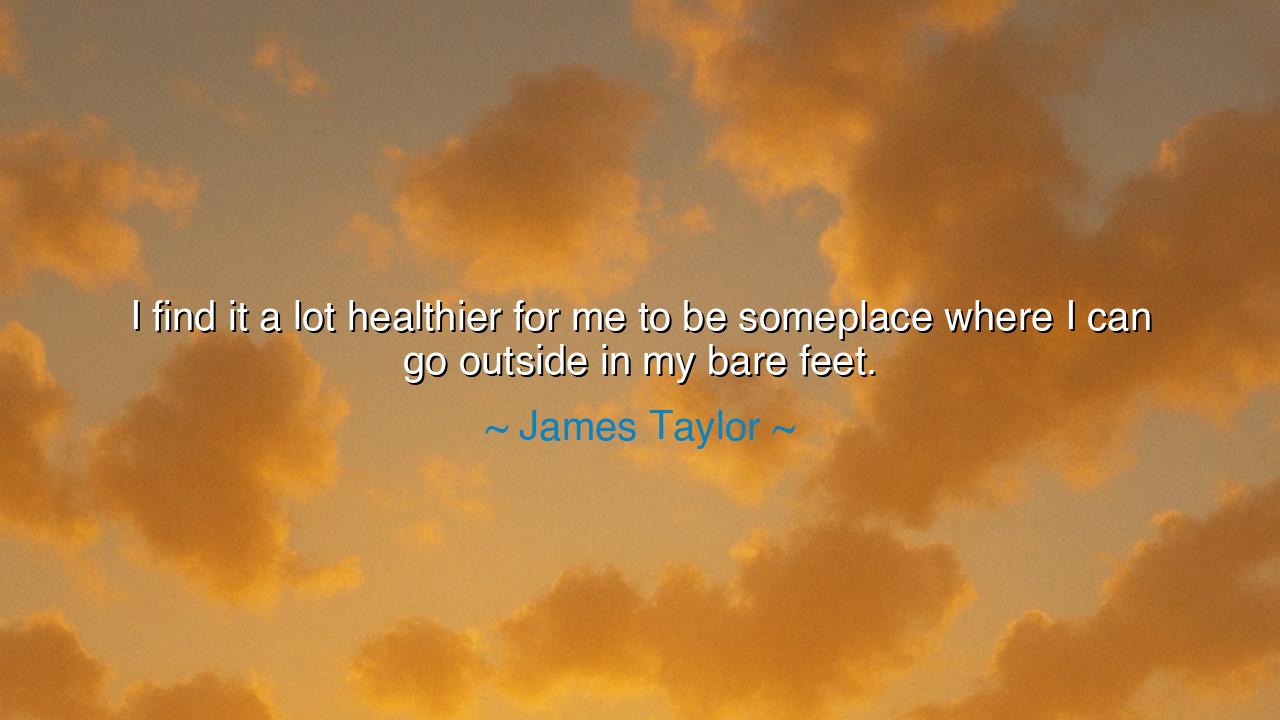
I find it a lot healthier for me to be someplace where I can go
I find it a lot healthier for me to be someplace where I can go outside in my bare feet.






In the gentle yet profound words of James Taylor, singer, poet, and seeker of simplicity, there lies a truth as ancient as the earth itself: “I find it a lot healthier for me to be someplace where I can go outside in my bare feet.” Though the words seem humble, their meaning runs deep — a call for the soul’s return to nature, to the grounding presence of the soil, to the quiet wisdom of the world beneath our feet. For in this age of walls and wheels, man has forgotten what the ancients knew — that health, both of body and of spirit, is born of connection, not confinement.
To walk barefoot upon the earth is to remember one’s origin. The sages of old taught that the human being is not separate from the world but made of it — dust of the stars, clay of the ground, breath of the wind. In touching the soil, one communes with the mother that bore all life. The body absorbs not only the warmth of the sun and the coolness of the grass, but also the subtle energy of the living earth. Modern science now whispers what the ancients already sang — that contact with the ground calms the heart, steadies the breath, and restores the mind. The wise call it earthing, but long before the term was named, the barefoot shepherd, the farmer, and the wanderer knew its sacredness.
When James Taylor speaks of being healthier in such a place, he is not merely describing physical comfort; he is describing the healing of the spirit. Fame and fortune, with all their glitter, often build walls between man and meaning. Taylor, who lived the tumult of stardom, found peace not in applause but in simplicity — in grass beneath his feet, in the touch of the world unfiltered by pavement or pretense. His words echo the longing that dwells in every human heart — the desire to belong again to the living earth, to feel the pulse of creation through one’s own skin.
The ancients lived by this wisdom. The monks of the East walked the mountains without shoes, saying that the earth itself was their teacher. The Greek philosophers gathered in gardens, believing that truth was better understood under the open sky than within marble halls. Even in the sacred texts, the divine voice spoke from burning bushes and mountaintops — always through the language of nature. For when the feet touch the ground, the heart remembers humility, and the mind grows clear. The soil reminds man that he is both mortal and eternal — of the dust, yet filled with light.
Consider the story of Leo Tolstoy, the great Russian writer. In his later years, after conquering the literary world, he abandoned the luxuries of wealth and returned to the land. He plowed his own fields, walked barefoot among his peasants, and found in their simplicity what palaces and fame could not give — peace. In feeling the earth beneath him, he rediscovered balance and purpose. His story, like Taylor’s, teaches that to touch the ground is to be touched by grace. The earth does not ask for perfection; it asks only for presence.
Health, as Taylor’s quote implies, is not merely the absence of sickness — it is the presence of wholeness. It is the harmony between the inner and the outer, between the breath and the breeze, between the body and the soil. In a world that prizes speed and spectacle, to go barefoot is an act of rebellion and remembrance — a return to the rhythm of life itself. It is to say, “I am alive, and this world sustains me.” The wise understand that no medicine can heal the soul as swiftly as sunlight, wind, and the touch of the earth.
Let this be your lesson, O seeker of balance: make time to walk upon the earth. Step outside not as a conqueror but as a child. Feel the grass, the sand, the rain, and remember that they are part of you. Set aside your shoes of distraction, your burdens of ambition, and let the ground remind you of the simplicity of being. For the earth heals all who listen — it restores energy to the weary, peace to the troubled, and joy to the restless.
So take heed of James Taylor’s wisdom: “Be someplace where you can go outside in your bare feet.” It is more than a preference; it is a philosophy of life. It calls you back to your truest nature — grounded, humble, and free. For when your feet touch the soil, your soul touches eternity, and in that sacred meeting lies the quiet, enduring secret of health, peace, and belonging.






AAdministratorAdministrator
Welcome, honored guests. Please leave a comment, we will respond soon